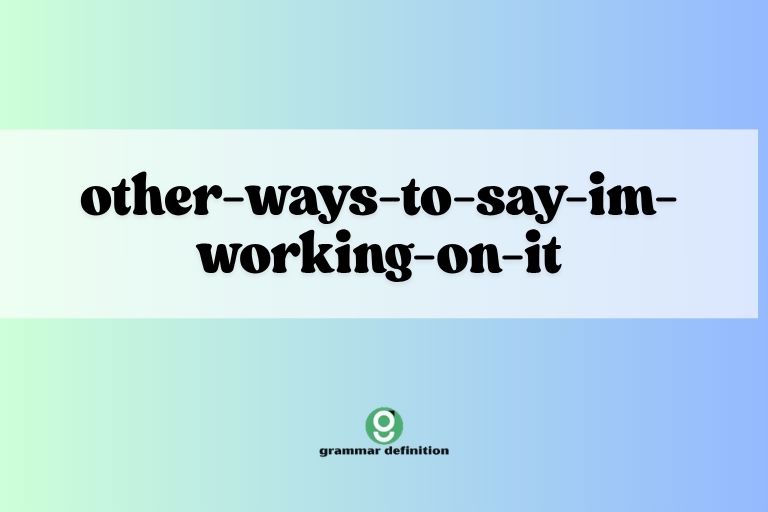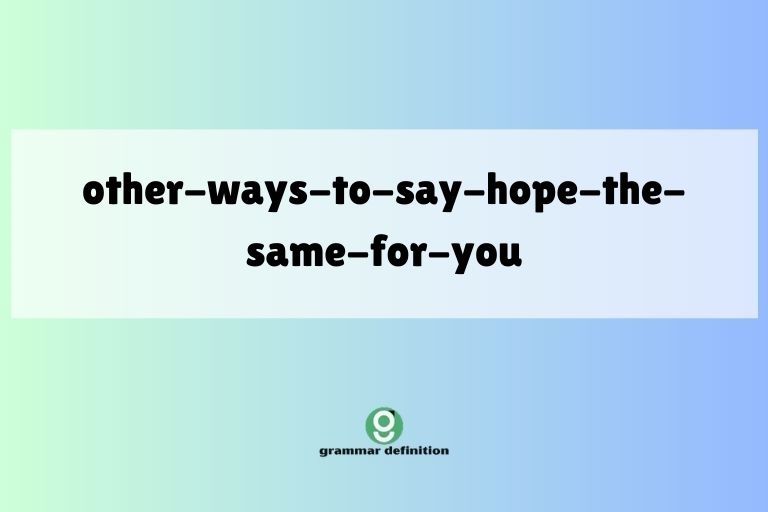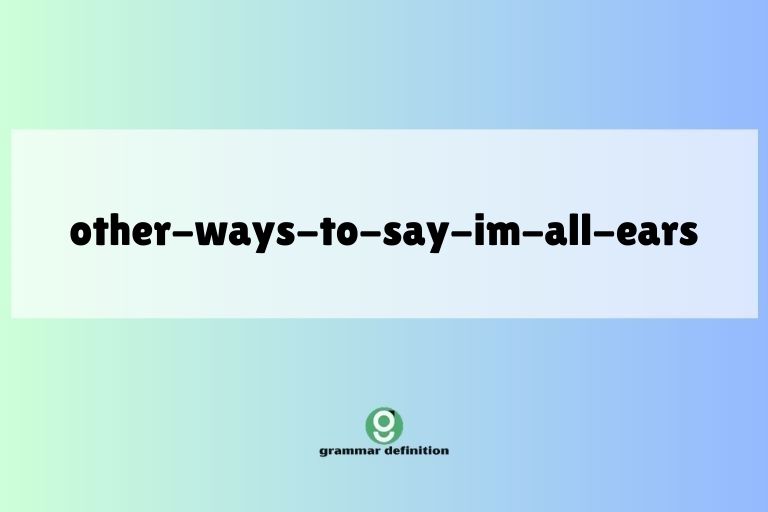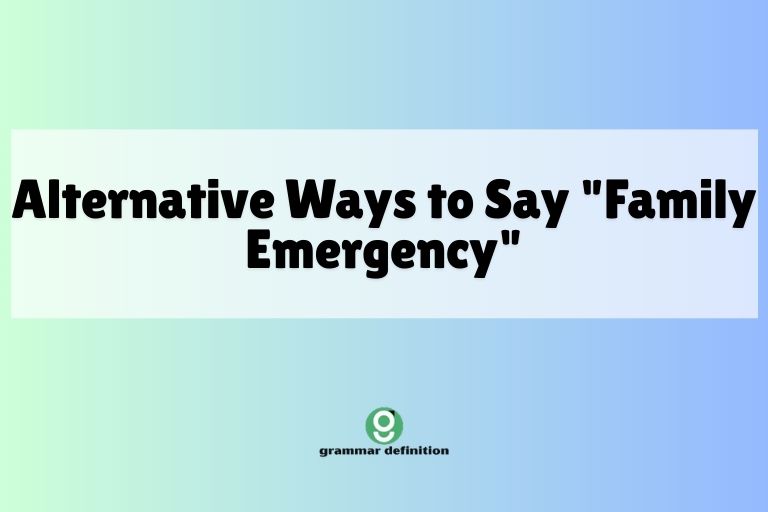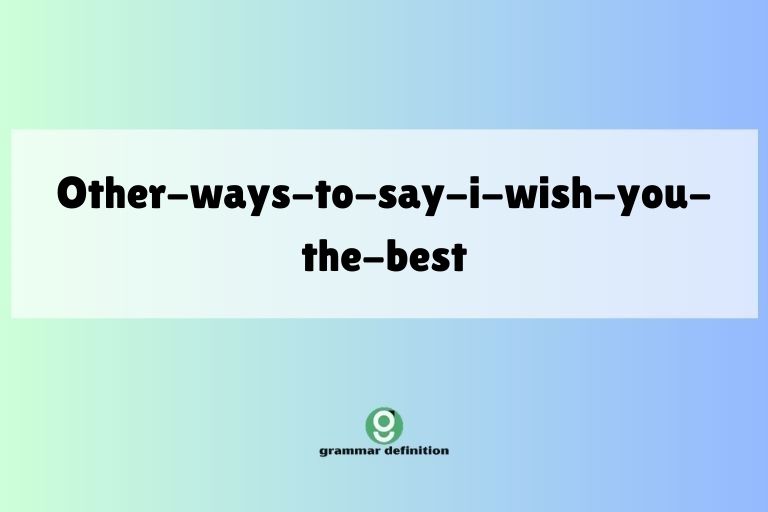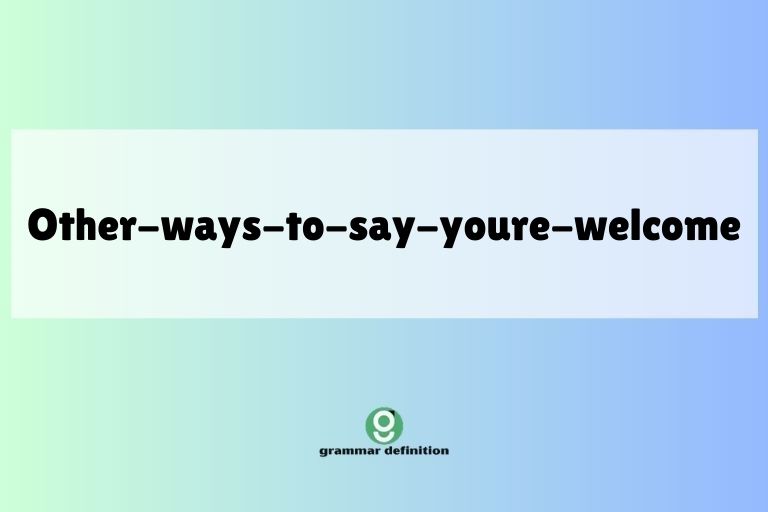Alternative Ways to Say “I Hope You Understand”: A Comprehensive Guide
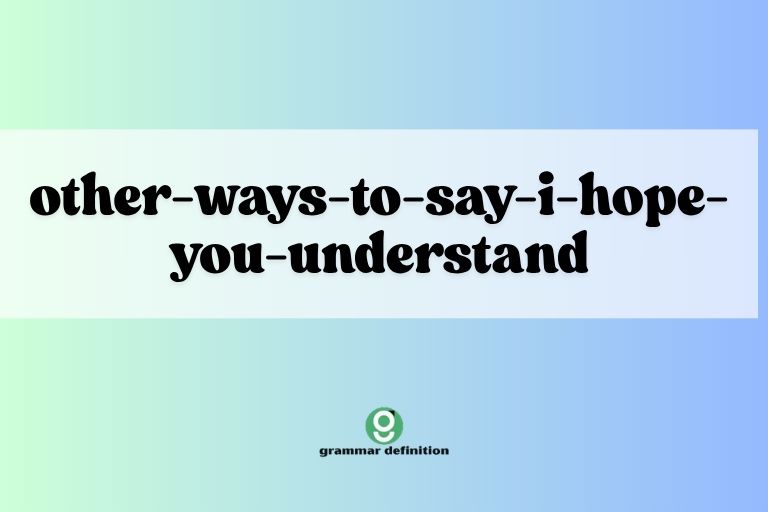
Effectively conveying understanding is crucial in communication, whether in professional settings, academic discussions, or casual conversations. While “I hope you understand” is a common phrase, overuse can make your language sound repetitive or even insincere.
This article explores a wide range of alternative phrases and expressions, each with its own nuance and appropriate context. Mastering these alternatives will enhance your communication skills, allowing you to express your desire for comprehension more precisely and impactfully.
This guide is perfect for English language learners, professionals aiming to refine their communication, and anyone seeking to enrich their vocabulary and express themselves more eloquently.
Table of Contents
- Introduction
- Definition: Conveying Understanding
- Structural Breakdown of Alternative Phrases
- Types and Categories of Alternatives
- Examples of Alternative Phrases
- Usage Rules and Considerations
- Common Mistakes to Avoid
- Practice Exercises
- Advanced Topics
- Frequently Asked Questions
- Conclusion
Definition: Conveying Understanding
Conveying understanding involves ensuring that your message is not only heard but also comprehended by the recipient. It goes beyond simple transmission of information; it involves confirming that the other person grasps the meaning, intent, and implications of what you’ve said.
The phrase “I hope you understand” is a direct way to express this desire for comprehension. However, its effectiveness depends heavily on context and tone.
Overuse can diminish its impact, making it sound perfunctory or even passive-aggressive. Therefore, exploring alternative phrases allows for more nuanced and effective communication.
The act of conveying understanding can be classified as a pragmatic aspect of language use. Pragmatics deals with how context contributes to meaning.
When we say, “I hope you understand,” we’re not just uttering words; we’re performing a speech act aimed at achieving a specific outcome: ensuring comprehension. This involves considering the listener’s perspective, their prior knowledge, and the potential for misunderstanding.
Structural Breakdown of Alternative Phrases
Alternative phrases for “I hope you understand” can be broken down into several structural categories, each with its own grammatical characteristics and intended effect. These structures often involve variations in verb tense, modal verbs, and the inclusion of specific nouns or adjectives to emphasize clarity or empathy.
Modal Verbs: Modal verbs like can, could, may, might, should, and would often play a crucial role in softening or strengthening the expression. For example, “I hope you can understand” implies a belief in the listener’s ability to comprehend, while “I hope you might understand” suggests a more tentative expectation.
Tense Variations: Shifting the verb tense can subtly alter the meaning. Using the past tense, as in “I hoped you understood,” can imply that the speaker is no longer certain of the listener’s comprehension. The present continuous tense, as in “I’m hoping you’re understanding,” can emphasize the ongoing nature of the communication and the speaker’s continuous desire for understanding.
Nominalizations: Transforming verbs into nouns (nominalization) can create more formal or abstract expressions. For example, instead of “I hope you understand,” one might say, “I hope for your understanding.” This construction adds a layer of formality and emphasizes the speaker’s desire.
Adjectives and Adverbs: Incorporating adjectives and adverbs can add specificity and nuance. For example, “I hope you fully understand” emphasizes the depth of comprehension desired, while “I hope you genuinely understand” highlights the speaker’s sincerity.
Types and Categories of Alternatives
The alternatives to “I hope you understand” can be categorized based on their primary focus or intent. Understanding these categories allows you to choose the most appropriate phrase for a given situation.
Clarity-Focused Phrases
These phrases emphasize the speaker’s desire for the listener to clearly grasp the information being conveyed. They often highlight the importance of understanding the details or implications of the message.
These are particularly useful when explaining complex concepts or providing instructions.
Empathy-Focused Phrases
These phrases acknowledge the potential difficulty or sensitivity of the topic and express a desire for the listener to understand the speaker’s perspective or feelings. They are useful in situations where emotional understanding is crucial, such as when discussing personal matters or resolving conflicts.
Confirmation-Seeking Phrases
These phrases directly seek confirmation that the listener has understood the message. They invite the listener to actively demonstrate their comprehension, often through questions or feedback.
They are particularly useful in interactive settings, such as presentations or training sessions.
Informal Expressions
These expressions are suitable for casual conversations with friends, family, or close colleagues. They often use more relaxed language and may include colloquialisms or slang.
While they can be effective in building rapport, they should be avoided in formal settings.
Formal Expressions
These expressions are appropriate for professional settings, academic discussions, or interactions with individuals in positions of authority. They use more precise and sophisticated language and avoid colloquialisms.
They convey respect and professionalism.
Examples of Alternative Phrases
Below are several examples of alternative phrases to “I hope you understand,” categorized by their primary focus. Each category includes a variety of options, ranging from formal to informal, to suit different contexts.
Clarity-Focused Examples
These phrases emphasize the importance of clear comprehension. They are useful when explaining complex topics or giving detailed instructions.
The following table contains examples, categorized by formality.
| Phrase | Formality | Example Sentence |
|---|---|---|
| I trust that clarifies things. | Formal | I trust that clarifies things regarding the new company policy. |
| I hope that’s clear. | Neutral | I hope that’s clear; please ask if you have any questions. |
| I hope that makes sense. | Neutral | I hope that makes sense; let me know if anything is unclear. |
| I hope I’ve made that clear. | Neutral | I hope I’ve made that clear, but I’m happy to elaborate further. |
| I want to be sure you’re following me. | Neutral | I want to be sure you’re following me; are there any points you’d like me to revisit? |
| Hopefully, that’s understandable. | Neutral | Hopefully, that’s understandable; it’s a complex process. |
| Do you follow? | Informal | So, the data gets sent here, do you follow? |
| Are you with me? | Informal | We’re going to try a new approach, are you with me? |
| I hope you get the idea. | Informal | I hope you get the idea; it’s a work in progress. |
| I hope that’s sunk in. | Informal | This is really important, I hope that’s sunk in. |
| I hope you’ve grasped the concept. | Formal | I hope you’ve grasped the concept after this presentation. |
| I hope you’ve understood the explanation. | Neutral | I hope you’ve understood the explanation, but please tell me if you haven’t. |
| I hope this is easy to digest. | Neutral | I hope this is easy to digest; it’s a lot of information at once. |
| I hope this explanation resonates with you. | Formal | I hope this explanation resonates with you, as it’s crucial to the project’s success. |
| I hope you can see where I’m coming from. | Neutral | I hope you can see where I’m coming from, as I’m trying to do what’s best for everyone. |
| I hope you appreciate the depth of this information. | Formal | I hope you appreciate the depth of this information, as it has taken many years to compile. |
| I hope you’ve digested all of that. | Neutral | I hope you’ve digested all of that, as it’s quite a bit to take in. |
| I hope you have gained some clarity. | Formal | I hope you have gained some clarity after this meeting. |
| I hope you now see the logic behind this. | Neutral | I hope you now see the logic behind this decision. |
| I hope you’re seeing the bigger picture now. | Neutral | I hope you’re seeing the bigger picture now, as it’s important for your role. |
| I hope this has shed some light on the matter. | Formal | I hope this has shed some light on the matter, and you’re now able to proceed. |
| I hope that has cleared up any confusion. | Neutral | I hope that has cleared up any confusion; if not, please ask. |
| I hope this has made things clearer. | Neutral | I hope this has made things clearer, but feel free to seek clarification. |
| I hope you get the gist of it. | Informal | I hope you get the gist of it; it’s not as complicated as it looks. |
| I hope you see my point. | Neutral | I hope you see my point; I’m trying to help you. |
| I hope you understand the reasoning. | Neutral | I hope you understand the reasoning behind this change. |
Empathy-Focused Examples
These phrases acknowledge the listener’s potential difficulty or emotional response. They are useful in sensitive situations where emotional understanding is important.
The following table contains examples, categorized by formality.
| Phrase | Formality | Example Sentence |
|---|---|---|
| I hope you can appreciate… | Formal | I hope you can appreciate the difficult circumstances we’re facing. |
| I hope you can understand where I’m coming from. | Neutral | I hope you can understand where I’m coming from; I’m trying to do what’s best. |
| I hope you can see my perspective. | Neutral | I hope you can see my perspective on this matter. |
| I hope you can understand my feelings. | Neutral | I hope you can understand my feelings about this situation. |
| I hope you can appreciate my position. | Formal | I hope you can appreciate my position in this difficult situation. |
| I hope you can relate to this. | Neutral | I hope you can relate to this; it’s something many people experience. |
| I hope you can empathize with this. | Formal | I hope you can empathize with this situation, even if you haven’t experienced it yourself. |
| I hope you can see the situation from my side. | Neutral | I hope you can see the situation from my side; it’s not as simple as it seems. |
| I hope you can grasp the significance of this. | Formal | I hope you can grasp the significance of this decision, as it will affect us all. |
| I hope you can appreciate the gravity of this situation. | Formal | I hope you can appreciate the gravity of this situation; we need to act quickly. |
| I hope you’re not taking this the wrong way. | Neutral | I hope you’re not taking this the wrong way; I’m just trying to be honest. |
| I trust you can understand the reasons behind this. | Formal | I trust you can understand the reasons behind this decision, given the circumstances. |
| I hope this makes sense to you. | Neutral | I hope this makes sense to you, considering the emotional aspect. |
| I hope you can understand my point of view. | Neutral | I hope you can understand my point of view, even if you don’t agree with it. |
| I hope you can find it in yourself to understand. | Formal | I hope you can find it in yourself to understand the difficult choices I had to make. |
| I hope you can see where I’m coming from with this. | Neutral | I hope you can see where I’m coming from with this; it’s not an easy situation. |
| I hope you can understand the constraints we’re working under. | Formal | I hope you can understand the constraints we’re working under, given the budget limitations. |
| I hope you can see the bigger picture here. | Neutral | I hope you can see the bigger picture here; it’s not just about the immediate problem. |
| I hope you can appreciate the complexities of this. | Formal | I hope you can appreciate the complexities of this issue; it’s not a simple fix. |
| I hope you can see the value in this. | Neutral | I hope you can see the value in this decision, even if it’s not immediately obvious. |
| I hope you can comprehend the depth of this. | Formal | I hope you can comprehend the depth of this research; it’s taken years to compile. |
| I hope you can see the long-term benefits of this. | Neutral | I hope you can see the long-term benefits of this plan, even though it requires some sacrifices now. |
| I hope you can see the necessity of this decision. | Formal | I hope you can see the necessity of this decision, given the circumstances. |
| I hope you can understand the reasons for my actions. | Neutral | I hope you can understand the reasons for my actions, even if you disagree with them. |
| I hope you can appreciate the challenges we’re facing. | Formal | I hope you can appreciate the challenges we’re facing, as we work to resolve this issue. |
Confirmation-Seeking Examples
These phrases directly invite the listener to confirm their understanding. They are useful in interactive settings where feedback is desired.
The following table contains examples, categorized by formality.
| Phrase | Formality | Example Sentence |
|---|---|---|
| Is that clear? | Neutral | So, we’ll start at 9 AM tomorrow, is that clear? |
| Do you understand? | Neutral | Please complete the form as instructed, do you understand? |
| Are you following me? | Neutral | We’re going to try a new approach, are you following me? |
| Does that make sense? | Neutral | This is how the system works, does that make sense? |
| Have I made myself clear? | Neutral | I need this report by Friday, have I made myself clear? |
| Am I being clear? | Neutral | I want to ensure we are all on the same page, am I being clear? |
| Can you confirm you understand? | Formal | Can you confirm you understand the terms and conditions? |
| Do you have any questions? | Neutral | I have finished the presentation, do you have any questions? |
| Are there any points you’d like me to revisit? | Neutral | I understand that was a lot of information, are there any points you’d like me to revisit? |
| Would you like me to clarify anything? | Neutral | If anything is unclear, would you like me to clarify anything? |
| Shall I go over that again? | Neutral | If that was confusing, shall I go over that again? |
| Can I explain anything further? | Neutral | I’m happy to answer any questions, can I explain anything further? |
| Is there anything you’d like me to elaborate on? | Neutral | If you need more detail, is there anything you’d like me to elaborate on? |
| Do you need me to rephrase that? | Neutral | If that was too complex, do you need me to rephrase that? |
| Do you need me to break that down further? | Neutral | If that was too complicated, do you need me to break that down further? |
| Are we on the same page? | Informal | So, we agree on the next steps, are we on the same page? |
| Do we have an understanding? | Neutral | So we’ve agreed on the terms, do we have an understanding? |
| Are we clear on this? | Neutral | So, we’re all in agreement, are we clear on this? |
| Have I made myself clear on this point? | Neutral | I want to be sure you remember this point, have I made myself clear on this point? |
| Did you catch all that? | Informal | That was a lot of information, did you catch all that? |
| Got it? | Informal | So we need to act now, got it? |
| Understood? | Informal | We need to follow protocol, understood? |
| Okay? | Informal | We’re going to do it this way, okay? |
| Right? | Informal | So, we’re all in agreement, right? |
| You with me so far? | Informal | I’m going to go through the steps, you with me so far? |
Informal Examples
These expressions are suitable for casual conversations with friends or close colleagues. The following table contains examples.
| Phrase | Example Sentence |
|---|---|
| Get it? | So, that’s how it works, get it? |
| You know? | It’s kinda complicated, you know? |
| Catch my drift? | I’m not saying it’s perfect, but you catch my drift? |
| See what I mean? | It’s a bit of a mess, see what I mean? |
| Dig? | That’s the plan, dig? |
| You feel me? | I’m just trying to do what’s best, you feel me? |
| You tracking? | I’m going to explain it, you tracking? |
| Are we good? | So, we’re agreed, are we good? |
| Do you vibe with that? | I’m suggesting we go with this, do you vibe with that? |
| Is that cool? | We’re going to do it this way, is that cool? |
| You picking up what I’m putting down? | I’m explaining the concept, are you picking up what I’m putting down? |
| You following? | I hope you are following? |
| You get what I’m saying? | I hope you get what I’m saying, it is important. |
Formal Examples
These expressions are appropriate for professional settings or academic discussions. The following table contains examples.
| Phrase | Example Sentence |
|---|---|
| I trust this explanation is satisfactory. | I trust this explanation is satisfactory for your understanding. |
| I hope this clarifies the matter. | I hope this clarifies the matter for all stakeholders. |
| I trust you comprehend the implications. | I trust you comprehend the implications of this decision. |
| I trust you appreciate the complexity of this issue. | I trust you appreciate the complexity of this issue that we are facing. |
| I hope you have a full understanding of… | I hope you have a full understanding of the implications of this. |
| I trust this has provided sufficient clarity. | I trust this has provided sufficient clarity for your decision. |
| I hope you are now fully apprised of… | I hope you are now fully apprised of all the relevant details. |
| I trust you are in full receipt of this information. | I trust you are in full receipt of this information regarding the new policy. |
| I trust that this explanation is comprehensive. | I trust that this explanation is comprehensive for your needs. |
| I hope this has elucidated the subject sufficiently. | I hope this has elucidated the subject sufficiently for further discussion. |
| I trust you now have a complete grasp of… | I trust you now have a complete grasp of all the material. |
| I hope this has provided clarity on this matter. | I hope this has provided clarity on this matter, and that you are now better informed. |
Usage Rules and Considerations
The choice of phrase should align with the context, audience, and purpose of the communication. Consider the following rules and considerations:
- Formality: Use formal expressions in professional or academic settings and informal expressions in casual conversations.
- Audience: Tailor your language to your audience’s level of understanding and familiarity with the topic.
- Purpose: Choose a phrase that aligns with your communication goal. If you want to ensure clarity, use a clarity-focused phrase. If you want to show empathy, use an empathy-focused phrase.
- Tone: Maintain a respectful and considerate tone. Avoid phrases that could be perceived as condescending or patronizing.
- Clarity: Ensure that your message is clear and concise. Use plain language and avoid jargon or technical terms that your audience may not understand.
- Sincerity: Be genuine in your desire for the listener to understand. Avoid using phrases that sound insincere or perfunctory.
Common Mistakes to Avoid
Several common mistakes can undermine the effectiveness of these phrases. Avoiding these errors will enhance your communication skills.
| Mistake | Correct Example | Incorrect Example |
|---|---|---|
| Using overly formal language in informal settings. | “Do you get it?” (Informal) | “I trust you comprehend the implications.” (Formal in an informal setting) |
| Using overly informal language in formal settings. | “I hope this clarifies the matter.” (Formal) | “Catch my drift?” (Informal in a formal setting) |
| Using condescending language. | “Does that make sense?” (Neutral) | “Is that too difficult for you to understand?” (Condescending) |
| Using passive-aggressive language. | “I hope you can appreciate my position.” (Empathetic) | “I hope you finally understand after all this time.” (Passive-aggressive) |
| Using jargon or technical terms without explanation. | “I hope this clarifies the process. Let me know if you need me to define any terms.” (Clear) | “I hope this clarifies the process.” (Unclear if the listener is unfamiliar with the process) |
| Being insincere in your desire for understanding. | “I genuinely hope you understand; please ask any questions.” (Sincere) | “I hope you understand.” (Said without any further engagement) |
Practice Exercises
Test your understanding with these practice exercises. Choose the most appropriate alternative phrase for each scenario.
Exercise 1: Choosing the Right Phrase
For each scenario, select the most appropriate phrase from the list below:
- I hope that’s clear.
- I hope you can appreciate the situation.
- Are we on the same page?
- Get it?
- I trust this explanation is satisfactory.
| Question | Answer |
|---|---|
| 1. You are explaining a complex new policy to your team in a formal presentation. | 5. I trust this explanation is satisfactory. |
| 2. You are casually explaining a joke to a friend. | 4. Get it? |
| 3. You are discussing a difficult situation with a colleague and want to show empathy. | 2. I hope you can appreciate the situation. |
| 4. You are giving instructions to a group of students. | 1. I hope that’s clear. |
| 5. You are confirming agreement with a business partner after a negotiation. | 3. Are we on the same page? |
| 6. You are explaining a new software feature to a colleague. | 1. I hope that’s clear. |
| 7. You are consoling a friend who is going through a tough time. | 2. I hope you can appreciate the situation. |
| 8. You are giving a presentation to potential investors. | 5. I trust this explanation is satisfactory. |
| 9. You are chatting with a close friend. | 4. Get it? |
| 10. You are wrapping up a meeting with your team. | 3. Are we on the same page? |
Exercise 2: Rewriting Sentences
Rewrite each sentence using a more appropriate alternative to “I hope you understand.”
| Question | Answer |
|---|---|
| 1. I hope you understand why I had to make that decision. | I hope you can appreciate why I had to make that decision. |
| 2. I hope you understand the instructions I just gave. | I hope that’s clear. |
| 3. I hope you understand what I’m trying to say. | Are you following me? |
| 4. I hope you understand the importance of this task. | I trust you comprehend the importance of this task. |
| 5. I hope you understand the terms of the agreement. | Can you confirm you understand the terms of the agreement? |
| 6. I hope you understand the complexity of this project. | I trust you appreciate the complexity of this project. |
| 7. I hope you understand my feelings about this matter. | I hope you can understand my feelings about this matter. |
| 8. I hope you understand the reasoning behind this strategy. | I trust you comprehend the reasoning behind this strategy. |
| 9. I hope you understand the consequences of your actions. | I trust that’s clear. |
| 10. I hope you understand that I’m doing my best. | I hope you can appreciate that I’m doing my best. |
Exercise 3: Fill in the Blanks
Complete each sentence with a suitable alternative phrase.
| Question | Answer |
|---|---|
| 1. After explaining the intricate details of the project, the manager asked, “____________?” | Are we on the same page? |
| 2. During a heartfelt conversation, she said, “____________, even if you don’t agree with me.” | I hope you can understand my point of view |
| 3. In a formal business meeting, the CEO stated, “____________ before we proceed further.” | I trust this explanation is satisfactory |
| 4. Casually chatting with a friend, he asked, “____________ with what I’m saying?” | You feel me? |
| 5. After giving a set of instructions, the teacher asked, “____________?” | I hope that’s clear |
| 6. After explaining the concept, the tutor said, “____________ with what I’m teaching you?” | You picking up what I’m putting down? |
| 7. After the difficult discussion, she said, “____________ the circumstances.” | I hope you can appreciate |
| 8. After the business deal was agreed upon, they asked, “____________?” | Are we good? |
| 9. After a long explanation on the phone, they asked, “____________?” | Did you catch all that? |
| 10. Before moving on, the speaker asked, “____________?” | Do you have any questions? |
Advanced Topics
For advanced learners, consider the following nuanced aspects of conveying understanding:
- Cultural Sensitivity: Different cultures have different communication styles. Be aware of cultural norms and adjust your language accordingly.
- Nonverbal Cues: Pay attention to nonverbal cues, such as facial expressions and body language, to gauge the listener’s understanding.
- Active Listening: Practice active listening skills, such as paraphrasing and summarizing, to confirm understanding and show engagement.
- Emotional Intelligence:
Cultivate emotional intelligence to better understand and respond to the listener’s emotional state.
- Adaptability: Be prepared to adjust your communication style based on the listener’s feedback and the evolving context of the conversation.
Frequently Asked Questions
When is it best to use a formal alternative?
Use formal alternatives in professional settings, academic discussions, or any situation where you need to convey respect and authority. Examples include meetings with senior management, presentations to clients, or formal debates.
When is it appropriate to use an informal alternative?
Use informal alternatives in casual conversations with friends, family, or close colleagues. These expressions can help build rapport and create a more relaxed atmosphere.
However, avoid using them in formal settings.
How can I ensure that I am not being condescending?
Avoid phrases that imply the listener is incapable of understanding or that you are superior in knowledge. Focus on using neutral or empathetic language.
Always be respectful and considerate of the listener’s perspective.
What if the listener still doesn’t understand after I’ve tried an alternative phrase?
Try rephrasing your message using different words or examples. Ask the listener specific questions to identify areas of confusion.
Be patient and willing to explain the concept from different angles. Consider visual aids or analogies to help clarify the message.
How do I choose the best alternative for a specific situation?
Consider the context, audience, purpose, and tone of the communication. Choose a phrase that aligns with these factors and effectively conveys your intended message.
If in doubt, err on the side of formality and respect.
Are there any phrases I should always avoid?
Avoid phrases that are condescending, passive-aggressive, or insincere. Also, avoid using jargon or technical terms without explanation.
Be mindful of cultural differences and avoid phrases that may be offensive or inappropriate in certain cultures.
How important is tone of voice when using these phrases?
Tone of voice is extremely important. Even a well-chosen phrase can come across poorly if delivered with the wrong tone.
Ensure your tone is respectful, patient, and sincere. Your nonverbal cues should also align with your words to convey genuine interest in the listener’s understanding.
Can I combine different phrases to create my own alternatives?
Yes, you can combine elements from different phrases to create your own alternatives, as long as the resulting phrase is clear, respectful, and appropriate for the context. Experiment with different combinations to find what works best for you.
How can I practice using these phrases in real-life situations?
Start by identifying situations where you typically use “I hope you understand.” Then, consciously try to substitute these phrases with alternative expressions. Pay attention to the listener’s response and adjust your approach as needed.
Practice with friends or colleagues to get feedback and improve your skills.
Is it ever okay to just say “I hope you understand”?
Yes, it is okay to use “I hope you understand” in certain situations, particularly when you’re looking for a straightforward and simple way to express your desire for comprehension. However, be mindful of overuse and consider whether an alternative phrase might be more effective in conveying your intended meaning and tone.
The key is to use it judiciously and sincerely.
Conclusion
Mastering alternative phrases for “I hope you understand” is a valuable skill that enhances communication effectiveness across various contexts. By understanding the nuances of clarity-focused, empathy-focused, and confirmation-seeking phrases, you can tailor your language to suit different audiences and situations.
Avoiding common mistakes and practicing these alternatives will not only enrich your vocabulary but also improve your ability to convey understanding with sincerity and respect. Embrace these techniques to become a more articulate and empathetic communicator in all aspects of your life.

